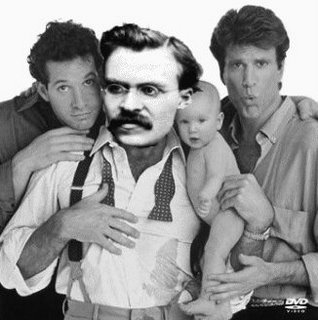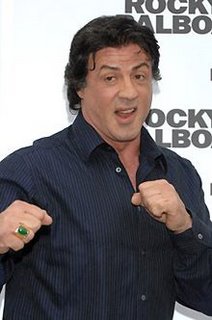Rambo III...in Fragments
 The bar scene ran like a shabby commercial for lager, the type where the ends are frayed and the ‘glamorous’ protagonists have but one tooth between them. Flanked by grandiose promotions for both Australian and Irish liquor, each an altar for its respective iconography, the public house swayed to the sounds of The Best Of Generic Pub Music Vol 1 – first a Bohemian Rhapsody to the jowls, then a Rock the Casbah to the groin, all met with the kind of bodily gestures that’d connote insanity outside this madhouse.
The bar scene ran like a shabby commercial for lager, the type where the ends are frayed and the ‘glamorous’ protagonists have but one tooth between them. Flanked by grandiose promotions for both Australian and Irish liquor, each an altar for its respective iconography, the public house swayed to the sounds of The Best Of Generic Pub Music Vol 1 – first a Bohemian Rhapsody to the jowls, then a Rock the Casbah to the groin, all met with the kind of bodily gestures that’d connote insanity outside this madhouse. Sandwiched somewhere between the spasmodic motions of a denizen or two, were a set of televisions, scattered about the establishment in a luscious ode to entropy. A steaming lump of football was the gawk-fodder of choice, the patterned progress of the ball attracting frequent glances from gaunt eyes. All was to be expected, and wearisome attention was pointed elsewhere. But then, suddenly this macho-posturing of a sport had ceased and a new glow had taken residence in the cathode ray.
Now the televisual apparatuses, shunning banality and embracing a fresh outlook, floated in an aura of headbands and monolithic movie posters. Like a hasty jolt of the sublime under the fingernails, or a haemorrhage soaked in perfection, or filigree fists of fury orbiting a larynx, this flashing marvel, beaten to a pulp by adjectival excess, unleashed its wonders to all the apathetic automatons inhabiting the locale.
Cascading in horizontal chorus across the RGB, a fine mixture of coruscating imagery and opening credits gifted us the confirmation we long sought, scribbling all over the blanks superimposed on our minds – it was indeed Rambo III.
Not the easiest environment for a screening of what I had preconceived as some almighty, hilarious Reaganite adventure full of mullets, sand, the Taliban, contradictions, ultra-right, nationalist absurdity, and enough machismo to melt every dynamic pose struck in Commando. Its reputation circumnavigated my skull as I attempted to get a handle on the situation. A number of problematics arose: the TVs were all muted – silenced by some pretentious barkeep playing the master/slave game with a remote control somewhere in the back – which meant that the film had a brand new soundtrack. What elements constituted this aural composite? Well, a mixture of yob favourites wrenched from thirty-odd years of popular culture, the sound-bites of misogyny steaming off nearby conversations, words (in)articulated with a complete lack of irony, slurs fomenting a negation of sorts in the near to distant future, and a duo of seemingly French ladies to my rear speaking about May 68 and the Situationists...probably.
What also made this viewing difficult was a lateness in the night, a temporal position of substantial remove from the beginning of the evening, that first sip of alcohol was a faint pixel on the horizon, and so there was a certain inebriation in effect here. Add to that a recently downed sambuca, and we start to get a proper view of this almighty problematic clouding lucidity and truncating the breadth of interpretation the circumstances yearns for. The blurred eyes of an optical system under attack from the froth of brain bubbles, plus the smoke of cigarettes and sleaze, create uncertainty and a task rife with impediment.
If one were so brave, you could also whack on to this quagmire the filter of time and the erosion of memory that accompanies it.
The fragmentation is now complete: Rambo III seen through a filter of extratextual sound, intoxication, time and psychological instability. But hey, that never stopped Ebert.
Following the deep and profound indentations of the opening credits of the film, in which we witness a slow waltz partaken by the words ‘Sylvester Stallone’ and a helicopter, we are reintroduced to Colonel Trautman, Rambo’s quasi-buddy from Rambo First Blood and Rambo’s Second First Blood. He’s somewhere, doing something, likely in
It is not long before the ether is smothered in the stench that we’ve been anticipating, the sweaty, soiled noumenon we envisaged sailing across our field of vision. Underwear dampened, and the finest aroma of excited nervousness swirling up to the ceiling, and there he is, John Rambo himself.
In a prescient reference to Kickboxer, made the following year, the scene has Rambo fighting some shirtless nasty in a squalid back-alley arena, surrounded by a mass of yelling, bloodthirsty spectators. And just then, when we thought things couldn’t get any more terrifying, Love Shack comes on. Cavorting in unison to the dictates of the B-52s, Rambo struck his opponent down in a succession of grimaced punches and unintelligible slander.
Then some hullabaloo, distorted and twisted in a bevy of mental negotiations. Slight glimpses of Kurtwood Smith, meetings igniting stratagems, headbands being unleashed from a long retirement, the sand granules interfering with Rambo’s attempt to reread Nabokov’s Bend Sinister, and burkas replaced by naked male chests.
The narrative was progressing along, the few stumbles coming mostly from large heads penetrating the tranquillity of my televisual vista. But concentration dedicated to Stallone was also injured in the hostile dialogue between a man determined to mispronounce every name he could think of (and that was quite a few) and the antagonist valiant enough to question his sexuality. Then there’s the redneck wannabe, complete with befuddled expression, surfeit girth and punctured ear lobes, who mounted an inquiry as to my own place of origin, taking any answer that was not
A quick turn of the head and Rambo III was back in view, but oh no, bad happenings were afoot. No less than a moment had passed, as the glories of Stallone’s triumphs on foreign dirt were manifesting themselves, before the channel was changed. And changed to what you might say? To the most detrimental action to the Stallone Project imaginable – golf.
Yes, that one, the bourgeois sport full of green and tartan. I was shocked and disappointed, and would have submitted my contempt for the orchestrator of this travesty had I not been distracted by a bear-trap strapped to some curious gent’s back.
I can only say that Rambo III is probably the best film of 1988, and would be the most joyous cud to ironically chew over for a prolonged period of time – such as is necessary to tease out the philosophical intricacies perceptible in Stallone’s belching of the screenplay.
The viewing may be bogged down in doubt and obscurity, but its effects were no less powerful. Last night, after stumbling into bed, I was visited upon by a deeply unsettling apocalyptic reverie: the dream was of massive air-ships, each of which were constructed to resemble Stallone’s head in Rambo III, crashing into a nearby metropolitan centre, causing mayhem, mass confusion and an increase in Rambo III DVD sales. The startling nocturnal illusion was like the Hindenburg disaster meets





